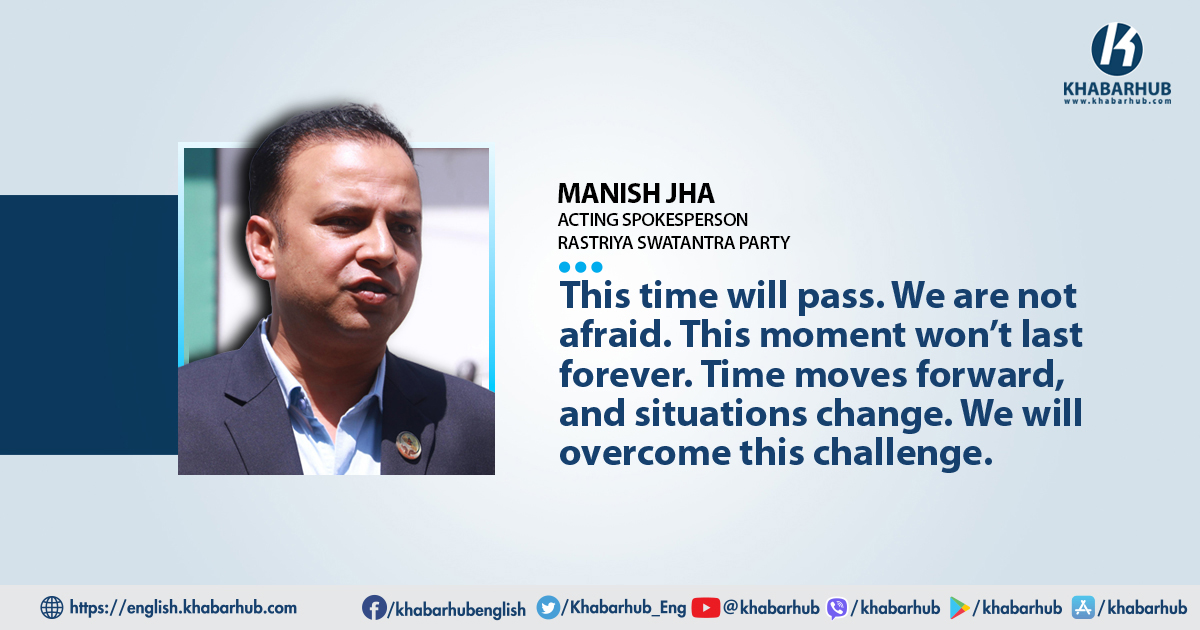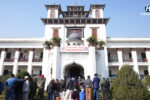KATHMANDU: Manish Jha is one of the 12 Proportional Representation (PR) MPs of the Rastriya Swatantra Party (RSP).
In the last election, the RSP secured 13 PR seats and 8 direct representation seats in Parliament.
Among these MPs, Manish Jha is considered one of the most prominent figures in the House of Representatives.
Jha is also seen as a key leader within the party. Currently, he serves as the Acting Spokesperson for the RSP.
The party has been grappling with several questions following the arrest of its Chair, Rabi Lamichhane.
What steps are the RSP leaders taking to resolve the crisis? Will the general convention scheduled for next Baisakh be postponed, or will it be held on time?
How will the RSP, which won the trust of more than 1.1 million voters in the last election, address the concerns of those who supported it?
And how will the party communicate with the public moving forward? These are some of the pressing issues within the RSP today.
The ruling party’s methods are not entirely just. For instance, a money laundering report may show large sums of money in someone’s account, but is anyone asking about the source of that money? The media also plays a role in perpetuating this narrative.
To understand how the party plans to navigate this crisis and its future direction, Khabarhub spoke briefly with Manish Jha, an MP of the RSP.
RSP Chair Lamichhane has been in detention. How difficult is it to move the party forward in this situation?
It is not as difficult as some people might think. Yes, many outside the party are concerned, and some have acted without fully understanding the situation.
But we are not in uncertainty. There is a new political generation that is rising.
And while some are worried, the common people are still hopeful. They are not anxious. They see that things are moving forward positively.
Despite the challenges, we have received support from many in other parties, especially from Nepali Congress and CPN-UML, and even from our well-wishers.
We are not letting the situation stall our campaign. Just because one member of the party has been accused and suspended doesn’t mean that the party’s progress should halt.
What sets RSP apart from other parties is that we have new faces with the ability, potential, and broad public acceptance to take on leadership roles.
Lamichhane’s political journey is not over; his return to the party is possible once his case is resolved.
We already have a strategy in place on how to move forward and handle this situation.
Even after the case was filed in court, we held meetings in four or five districts.
Most recently, in Kanchanabari, we continued our campaign without interruption. Our work continues as usual.
The party has appointed DP Aryal as the Acting Chair, but there are concerns that he may not be widely recognized by the public. Are you worried this could make it difficult to lead the party?
No, I’m not worried. Whether the public knows DP Aryal well or not is a separate issue.
He is one of the founding members of the party and has played a crucial role in its development.
He deeply understands the party and its vision. The question we should be asking is: Do the Congress and UML need leaders who are well-known to the public, or do they need leaders who can truly lead the party and its cadres?
Aryal is the leader we need right now to guide the party forward. Since the party’s inception, he has been closely involved in monitoring not just the party’s activities but also its relationship with the people.
He understands the party structure and has the experience to handle these challenging times.
Another Vice Chair, Dr. Swarnim Wagle, has also expressed his support for the current leadership.
We are on the verge of the general convention. It’s important to note that we didn’t elect him for five years.
We are holding district meetings to prepare for the general convention, and the process is moving forward as planned.
In these times, long delays are not typical. However, if the president returns after being appointed or elected by the general convention, that will be a matter of his ability, and it should be accepted as a natural course of events.
The party has said that the general convention will be held in Baisakh. Even if the Chairman is in custody, will the convention still take place?
The party’s process continues. On the day his case was being registered, we held meetings in three or four districts.
That alone shows that we are continuing our work as usual. The RSP is moving forward with its regular processes, and there is no pause or hesitation. We remain focused on advancing our political agenda.
Moreover, we firmly believe that justice will prevail. The RSP will continue to move forward with its political process. Wherever the president is, we will continue to strengthen the party.
Do you still believe Chairman Lamichhane is innocent?
Yes, we do. While it’s possible he made mistakes, either knowingly or unknowingly, it does not mean he is entirely guilty.
It is not true that he tried to deceive the public by misusing cooperative funds for media investments.
There could have been external influences or groups that misled him. The government should have also investigated GB Rai in this case.
With such a two-thirds majority government, how can the Chairman be singled out without addressing the other individuals involved?
We have full faith in the Chairman. If the court’s decision is based on the political or party affiliation of the person involved, that would not be impartial.
The court will ultimately determine how the ruling party has handled the opposition, and we trust that its judgment will be fair and unbiased.
We hope the court will make its decision based on the facts, law, and its own discretion.
Given the various scandals, has the trust placed in Lamichhane and the RSP by the 1.13 million voters been damaged? How do you assess this situation?
There is no need to rush to conclusions. We don’t need to explain everything right now, and there is no immediate danger in delaying it.
The accusations are still unproven, and we can wait. Furthermore, many of these accusations have come from external sources, and they are yet to be substantiated.
That said, I did notice in the media that UML leader and Public Accounts Committee (PAC) Chairman Hrishikesh Pokharel had written a letter to extend the leave of his wife, who is absconding after allegedly embezzling cooperative funds.
Shouldn’t there be an investigation into that as well? Similarly, what has happened with the case involving Congress Vice President Dhanraj Gurung and his wife, Jyoti Gurung?
There are countless allegations against leaders from the ruling party, but the media and political elites quickly accept them as true, while opposition leaders are attacked without evidence. Why is this double standard allowed?
Our chairman has supported the investigation into these issues. Why is the ruling party not showing the same commitment to transparency and accountability?
This alone highlights the bias and lack of impartiality in the current political environment.
The chairman of the parliamentary committee PAC requested leave for a person with an arrest warrant. If the government ignores this, what message does it send to the public?
This alone shows the level of revenge and bias at play. If such actions are ignored, people will understand exactly how politically motivated and one-sided the system has become.
The decisions being made while political parties are still in the process of completing their internal procedures have made it clear what the real intentions behind these moves are, and they are exposing themselves in the process.
The accusations against our chairman are serious, but if there is evidence, we will accept the court’s decision.
However, the way the case evolved—starting with the cooperative case, then shifting to money laundering, and later organized crime—seems like a strategy to pressure and destroy him.
It feels as though the authorities are saying, “We will use everything at our disposal to finish you off.”
In Nepal, it seems that if someone like Shekhar Koirala raises his voice within the Nepali Congress, or if someone in the UML opposes their leadership, they’re quickly threatened or pushed to the margins.
This has become a harmful political practice, where opponents are trapped by filing cases based on flimsy grounds. This creates a false illusion of justice.
While such tactics may benefit certain individuals in the short term, they harm the country, politics, and society in the long run.
The ruling party’s methods are not entirely just. For instance, a money laundering report may show large sums of money in someone’s account, but is anyone asking about the source of that money? The media also plays a role in perpetuating this narrative.
What is your view on the media’s role in the current situation?
The media, too, has become part of this narrative. They report on certain issues without fully understanding the context or questioning the real sources.
Time will answer these questions, but now is not the time to make hasty judgments about the future of the party, the organization, or the charges.
We have to wait. There’s no need to rush. Waiting a little while doesn’t mean waiting years—it could be a few weeks, months, or even days.
The court’s proceedings are still ongoing, and the public is also waiting for clarity. Let’s allow time for the full truth to emerge.
However, while the investigation is still ongoing, Ravi’s MP position has been suspended, and he has also been removed from the parliamentary committee…
We must acknowledge that this situation has, in some ways, worked in our favor.
The actions taken—who did what, what was said, and how decisions were made—have revealed the true character of everyone involved.
These are challenging times. This is not a typical situation. In the party’s founding announcement program, the chairman, Lamichhane, had said in Kathmandu that while we may be cleaning the mud of others, some of that mud could spill over onto us, and it might confuse people.
The decisions being made while political parties are still in the process of completing their internal procedures have made it clear what the real intentions behind these moves are, and they are exposing themselves in the process.
What decision did the Supreme Court make regarding MP Tek Narayan Gurung? What action did the committee take? Was Laxmi Koiri, an elected MP from Mahottari-1 who is absconding on charges of murder, removed from the committee after being suspended?
The committee chairmen did not remove Tek Bahadur Gurung or Koiri, but when Lamichhane’s writ was filed, he was removed.
Shouldn’t they be held accountable for this? They must answer for these inconsistencies.
Less than two years after the establishment of the RSP, hasn’t public trust been shaken due to the scandals that have emerged?
We must understand that this is the result of the current circumstances. Some important decisions will be made in upcoming meetings and assemblies.
The acting leader may be replaced, and new responsibilities could be assigned.
Not a single meeting has been held since he stepped down as the leader of the parliamentary party.
The chairman’s statement is still pending, and we don’t need to rush into appointing a new leader before that. We have some time to consider our next steps.
The chairman has always emphasized that the party must remain dynamic.
He believes the party should move forward with a new vision, understanding the strategies and tactics used by older parties.
Wherever I am, the party must remain adaptable and continue to grow. The chairman is concerned about expanding the party’s reach further.
So, what would you say to the people right now?
These are challenging times. This is not a typical situation. In the party’s founding announcement program, the chairman, Lamichhane, had said in Kathmandu that while we may be cleaning the mud of others, some of that mud could spill over onto us, and it might confuse people.
Now, while we’ve been cleaning up the mess of others, some of that mud has inevitably fallen on us. But don’t jump to conclusions—we are not in trouble. This will be resolved.
I’m reminded of a story where Akbar asks Birbal, “Tell me something that will make me calm and not angry, and I won’t bow down to anyone.” Birbal replies, “In any situation, you should always remind yourself that this time will pass.”
That’s how we see it—this time will pass. We are not afraid. This moment won’t last forever. Time moves forward, and situations change. We will overcome this challenge.









Comment